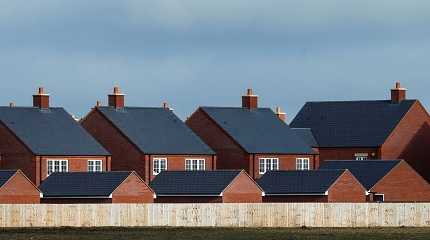
LONDON, Feb 28 (Reuters) - British home prices will fall less than previously expected in 2023 as a resilient job market and easing recession fears soften the blow from higher borrowing costs, analysts polled by Reuters said.
Inflation running at multiple times its 2% target has pushed the Bank of England to embark on an aggressive policy tightening path and Bank Rate has gone from 0.10% in late 2021 to 4.00% today.
Homebuyers are likely to be faced with a further increase in mortgage rates as the BoE will add another 25 basis points next month before pausing, a separate Reuters poll found.
After years of bumper price rises, the average cost of a home will fall 2.4% this year, according to the Feb. 15-27 poll of 19 housing market experts, shallower than the 4.7% fall predicted in a November poll. House prices will rise 1.0% next year on average and 3.5% in 2025, medians showed.
"It's likely 2023 will be a year of transition as buyers and sellers adapt to a new era of higher interest rates before the market returns to growth again in 2024," said Aneisha Beveridge at estate agency Hamptons.
UK homebuilders Bellway (BWY.L) and Redrow (RDW.L) reported a slight pickup in activity at the start of the year but said the market remained challenging, with higher loan costs and broader inflationary pressures keeping buyers away.
House prices soared by more than a quarter during the COVID-19 pandemic, boosted by ultra-low interest rates, tax incentives and demand for more living space during lockdown, but the boom now gone into reverse.
Britain's housing market saw the most widespread price falls since 2009 in January, a RICS survey showed earlier this month, and when asked in the Reuters poll how much values would fall from peak to trough, the median was 8.0%. Forecasts ranged from 0.0% to 17.5%.
"House prices will fall in 2023, that is for sure. But it is not going to be a disaster; and certainly not a disaster as forecast by a number of commentators," said Tony Williams at consultancy Building Value.
"Why? Because the number one variable for showing the direction of the housing market is employment - and that remains very, very good indeed."
While 11 of 14 respondents in the survey said affordability would improve, the increased costs associated with buying a property means home ownership will decrease over the next few years, according to eight respondents in the poll. Only three said it would increase.
For those not yet able to buy a home, average rental prices will go up 5.0% this year and next and 3.3% in 2025, the poll found. Ten of 11 respondents said rents would become less affordable over the coming two years and only one held the opposite view.
Prices in London, long a magnet for foreign investors, will witness a steeper drop of 5.0% this year before rising 2.0% in 2024 and 4.0% in 2025. In November's poll, they were expected to fall 7.0% this year and flatline in 2024.
"London will recover more strongly in the medium term as political unrest, economic uncertainty and returning overseas buyers hike demand," said Russell Quirk, an independent property analyst.
"London is seen as the jewel in any international portfolio and that won't change."
(For other stories from the Reuters quarterly housing market polls:)




